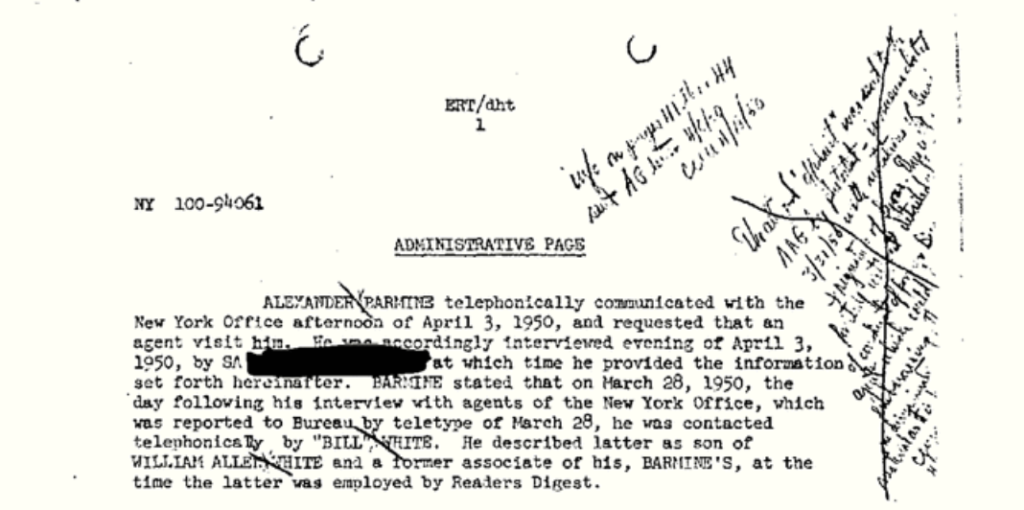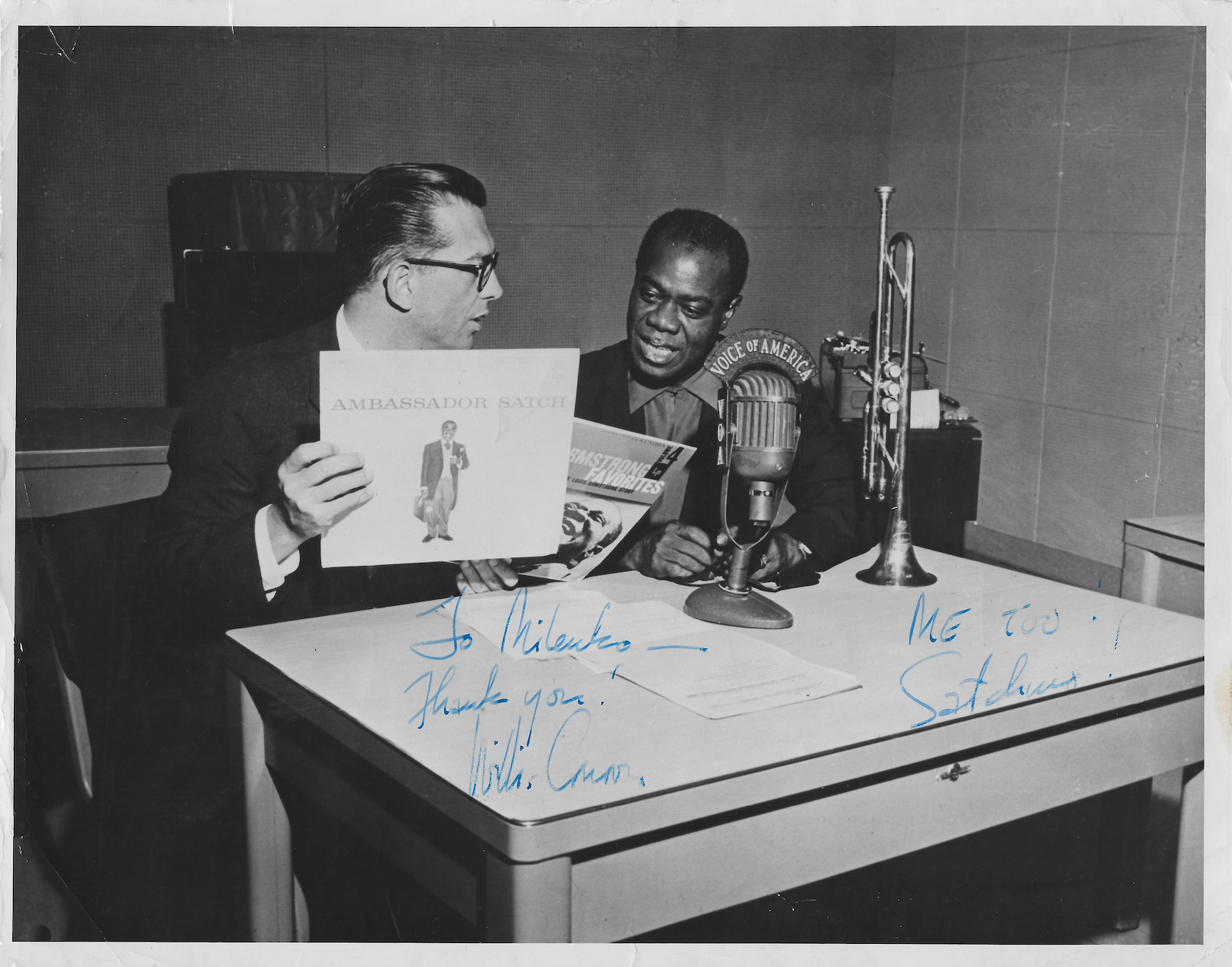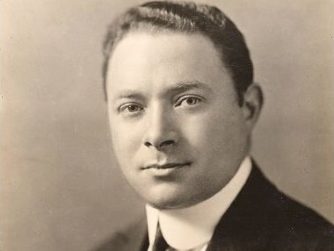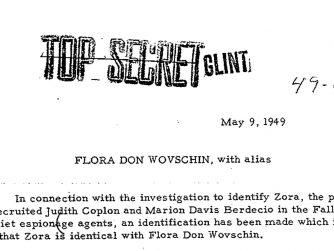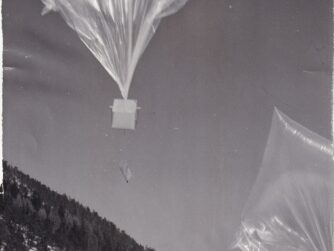Ted Lipien for Cold War Radio Museum
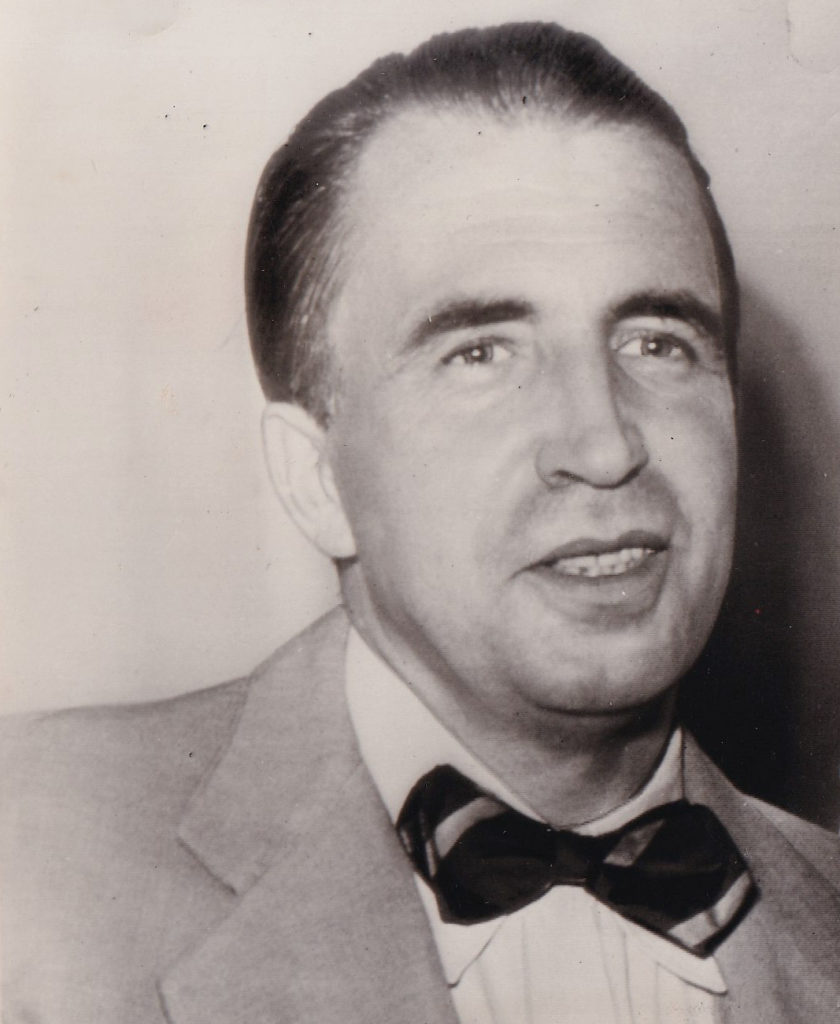
On March 5, 1953, the day Joseph Stalin died but before the news of his death became public, Alexander Gregory Barmine (Russian: Александр Григорьевич Бармин – Alexander Grigoryevich Barmin), the chief of the Russian Branch of the Voice of America (VOA) U.S. government international radio broadcasting station complained while testifying before the Senate Permanent Subcommittee on Investigations, chaired by Senator Joseph McCarthy (Republican – Wisconsin), that State Department officials in the International Information Administration (IIA) overseeing at that time VOA operations and providing policy guidance turned down his repeated requests to analyze in a series of programs the possible consequences of the Soviet dictator’s death.
Alexander Barmine was a former Soviet military intelligence officer with the rank of brigadier general, a Soviet diplomat, businessman, a Red Army soldier in the 1920 Polish-Soviet War, and a U.S. Army soldier in World War II, a Soviet spy, and an American spy, journalist, and writer. He was one of the first high-level Soviet defectors in the West. He married President Theodore Roosevelt’s granddaughter, Edith Kermit Roosevelt, but they divorced after only four years of marriage. Long before the publication of Alexandr Solzhenitsyn‘s The Gulag Archipelago, he wrote about the Gulag –– the Soviet network of forced labor camps –– in which millions were imprisoned and died.
Barmine told the McCarran U.S. Senate investigative subcommittee in 1951 that his boss in the Soviet intelligence GRU, General Berzin, identified to him in the 1930s American journalist Joseph Fels Barnes, who later was in charge of all Voice of America radio programs, as one of “his men.” According to Barmine’s testimony, General Yan Karlovich Berzin, a Latvian Communist executed on Stalin’s orders in 1938, told Barmine in the mid-1930s that Barnes could help in his intelligence work in China for the Soviet Union. After Barmine testified, Barnes immediately called him and General Berzin “specialists in the kind of unmitigated lying professionally engaged in by both Communists and ex-Communists.” He added that he had never been a Communist, a sympathizer with communism, or an agent for the Soviet Union.1
However, those Americans and Europeans who got to know Barmine –– including former Marxists who turned against communism after visiting Russia but held on to their progressive views, left-leaning liberals, and right-wing conservatives –– agreed that his good character, truthfulness, and integrity were beyond question. In the introduction to Barmine’s 1945 book, One Who Survived: The Life Story of a Russian Under the Soviets, Max Eastman, an American writer, poet, and political activist, who despite his break with communism and socialism remained a passionate advocate for social and economic justice, wrote that “There is no need to stress his clear candor and truthfulness, for that is apparent in every page of his book.2
In the early 1950s, Alexander Barmine testified before three different U.S. Senate subcommittees investigating the Voice of America operations, communist propaganda, and Soviet spying in the United States. In July 1951, he gave what appears to be restrained and honest testimony before the Senate Internal Security Subcommittee, chaired by Senator Pat McCarran (Democrat – Nevada), identifying Joseph Barnes and Owen Lattimore, another World War II era U.S. government official, as possible spies for the Soviet military intelligence. Lattimore was responsible for the wartime Voice of America broadcasts and other propaganda programs to Asia. In December 1944, he published an article in the National Geographic Magazine after he visited Russia with Vice President Henry A. Wallace, stating that the Russians were volunteering to work in the infamous Kolyma gold mines, where Stalin’s Gulag slave laborers were dying by thousands, and furthermore, that there were hothouses to grow vegetables to make sure the gold miners were getting enough vitamins in their diet.3 Of Barmine’s testimony, Lattimore said it “sounds like a case of psychological instability marked by chronic hallucinations.”4
Barmine did not make up the story about Barnes and Lattimore on his way to appear before the McCarran subcommittee to win publicity. He had already informed the Federal Bureau of Investigation (FBI) about them when questioned on another matter in a confidential interview in December 1948, at about the same time he joined the Voice of America to head the VOA Russian Service.5 According to declassified FBI memoranda, even though he mentioned them to the Bureau, he was reluctant to publicize his information about Barnes and Lattimore, considered it uncorroborated, and freely admitted that he lacked sufficient proof. He had no doubts, however, that Barnes and Lattimore had engaged for years in deceptive propaganda in support of Soviet and other communist interests. Barmine stated it publicly without any hesitation when asked about it during his congressional testimony. According to the FBI, he felt it was his duty to mention it in a confidential interview in 1948. He considered their activities supporting Soviet interests and propaganda dangerous for the United States in the Cold War with Stalinist Russia.
In March 1953, Barmine was again subpoenaed to testify, this time before the Senate investigative subcommittee of the Committee on Government Operations chaired by Senator Joseph McCarthy. In responding to Senator McCarthy’s questions, he agreed with his criticism of some State Department information specialists deciding on programming policy for VOA. Still, he refused to criticize others, whom the junior Senator from Wisconsin tried falsely to present as likely participants in a continuing Soviet-run conspiracy. At all times, Barmine fiercely defended the VOA Russian Branch from interference by Senator McCarthy’s staffers and fought to prevent McCarthy from attacking the work of his subordinates.
McCarthy made a mockery of the legitimate U.S. Senate’s bipartisan interest in uncovering Soviet spying and influence operations. He made false accusations against many innocent witnesses. He focused on irrelevant details, some of them of sexual nature, but Barmine had nothing to do with these testimonies and did not contribute to them. He gave well-reasoned answers to questions he was asked, showed his tremendous first-hand knowledge of Soviet affairs, and did not offer any remarks that anybody could view as irresponsible or embarrassing except Communists and the most naive fellow travelers.
There is also evidence suggesting that Barmine was not at all eager to testify before the U.S. Senate. According to a declassified FBI document, before Barmine gave public testimony to the McCarran subcommittee on July 31, 1951, Senator McCarthy’s staffers tried contacting him in April 1950. At that time, Barmine told a friend that, as noted in a declassified FBI file, “he did not desire that McCARTHY be advised as to his whereabouts; that what information he had was uncorroborated and was already known to McCARTHY… .” After one of McCarthy’s staffers succeeded in finding out that he was at his Voice of America office, Barmine made an effort to avoid meeting him. When he finally consented to meet one of McCarthy’s investigators, he refused to sign an affidavit sought by the Senator.6
Senator McCarthy’s staffer who unsuccessfully pressured Barmine to sign an affidavit about Joseph Barnes and Owen Lattimore was Donald A. Surine, a former FBI agent fired by the Bureau over his involvement with a woman linked to a Bureau investigation but liked by FBI Director J. Edward Hoover and recommended by him to McCarthy to be in charge of his subcommittee’s investigative unit. The handling of the incident by Barmine is described in a declassified FBI file on Owen Lattimore and his role in the Institute of Pacific Relations (IPR), which faced accusations from dissident former members and the U.S. government of employing Soviet and communist sympathizers:
BARMINE said that he immediately told SURINE that he would make no affidavit, that he did not appreciate the manner in which SURINE had approached him, and he wanted nothing further to do with the matter. He then left SURINE. On, BARMINE thinks, Thursday, March 30th, the newspapers carried the story to the effect that he, BARMINE, "had made an affidavit" regarding LATTIMORE.
Apparently as a result of this, BARMINE was summoned to the office of his "VOA CHIEF" and questioned concerning the matter. BARMINE said that be told his chief the whole story and further told him definitely that he had given no affidavit and thus if McCARTHY had one as he claimed, it was a forgery. His Chief asked him if he had told his information to the FBI and BARMINE said that he had. The Superior then asked specifically if he, BARMINE, had mentioned JOSEPH BARNES and OWEN LATTIMORE to the FBI by name, to which BARMINE replied that he had. BARMINE commented that his Superior asked this latter question more or less in the idea of "softening the thing," that is BARMINE’s action in naming BARNES and LATTIMORE. However, BARMINE said he explained to his Superior that he had definitely named these individuals as he had received the information from BERZIN, he believed it to be true, and he definitely felt that it was "my duty" to so inform the FBI.
The following day, March 31st, BARMINE talked to EUGENE LYONS. LYONS told BARMINE that SURINE, after leaving BARMINE, had come to "Lyon’s place”, told the latter of his visit to BARMINE, said that BARMINE had made statements to him but would not sign an affidavit. He then proceeded to use LYONS’ typewriter to type up "an affidavit" which contained the information he said BARMINE told him. He then showed this to LYONS and asked the latter if he had heard BARMINE make the statements, as contained in the supposed affidavit, aforementioned. LYONS said that he had. SURINE then, according to what BARMINE was told by LYONS, got the latter to sign this paper to that effect. BARMINE said that he berated LYONS for his action and told him that he should have known better; that he should have known that if he was willing to make such remarks to SURINE he would have been willing to sign an affidavit to that effect.
BARMINE said that he understood, partly from LYONS and in part from the newspapers, that McCARTHY had turned this affidavit over to the FBI. His purpose in contacting the New York Office, BARMINE continued, was to advise first that any affidavit allegedly signed or made out by him was a forgery and that any statements made by SURINE to the effect that he, BARMINE, had spoke to him, or told him, anything regarding LATTIMORE, BARNES, the IPR, or related matters, would be perjury on the part of SURINE.
FURTHER, BARMINE said that if he was ever confronted with this supposed affidavit he would not hesitate to identify it as a forgery and a perjurour's act on the part of SURINE. He further desired that if McCARTIY had not made this paper available to the FBI as reported to him, BARMINE, then, if possible, he would like to have McCARTHY made aware of the fact that the affidavit was a forgery and of the tactics utilized by investigators representing him. In this respect BARMINE was advised that the Bureau was not in the position of relaying messages to Senator McCARTHY and that if he desired that this information be made available to McCARTHY he should do so himself.7
David M. Oshinsky, a professor of history at Rutgers University who wrote a critical book about Senator McCarhty’s investigations, noted inside accounts stating that “Alexander Barmine became very disturbed at the way the investigation was injuring … some of the really strong anti-Soviet elements inside the Voice.” Oshinsky’s book includes information that Barmine asked for a meeting with Senator McCarthy, during which he complained about his staff’s tactics, and “something of a row followed,” but McCarthy later said in a statement to the press that he wanted to reform the Voice of America, not to kill it. Prof. Oshinsky noted that in 1953 Barmine “testified at the public hearings, but rarely to the chairman’s [Senator McCarthy’s] advantage.”8 After Barmine talked to him, McCarthy never criticized VOA’s Russian Service.
In March 1950, Senator McCarthy may have been desperate to get an affidavit from Barmine and to get him to testify before the Subcommittee on the Investigation of Loyalty of State Department Employees, also known as the Tydings Committee, after the subcommittee’s chairman, Senator Millard Tydings, a Democrat from Maryland. Tydings was highly critical of McCarthy’s accusations of communist influence in the State Department and rejected them as baseless. Barmine’s testimony could have helped McCarthy if Barmine had offered more information about Barnes and Lattimore. Still, he did not want to go beyond what he had told the FBI because he knew nothing more about their possible involvement with Soviet military intelligence. He was not called to appear before the Tydings Committee, which was deeply divided along party lines and embroiled in partisan infighting. In the record of the subcommittee’s hearings, there is a short reference to Barmine without his name being used and to an affidavit from him, which may have been the one he did not sign and condemned as fake.
None of the U.S. Senate investigations and hearings in the early 1950s uncovered an existing Soviet subversion of the Voice of America or still active Soviet spies. They did not prove that Joseph Barnes and Owen Lattimore were at any time Soviet intelligence agents or even Communist Party members. However, they did show that both men supported Soviet interests with deceptive propaganda or naively repeated disinformation and were in frequent contact with known Communists and Soviet agents. They also produced evidence of past subversion at the State Department and the Voice of America, ongoing mismanagement of programs, wasteful spending, and, in a few cases, continuing and hard-to-explain timidity on the part of a few VOA officials to counter Soviet propaganda. Still, by 1950, most, if not all, communist agents of influence and spies were no longer employed in supervising and producing VOA broadcasts. They worked at the Voice of America during and shortly after World War II.
Alexander Barmine’s friend, Eugene Lyons, whom he chastised for giving information to a member of Senator McCarthy’s staff, had known many pro-Soviet fellow travelers before they started working for the U.S. government’s OWI wartime propaganda agency. He was born in 1898 to a Jewish family in Uzlyany, now part of Belarus but then part of the Russian Empire. His parents emigrated to the U.S., and he grew up in New York City. He had been a communist sympathizer before becoming a fervent critic of the Soviet Union. In the 1920s, he worked in the United States as a correspondent for the Soviet news agency TASS and was a United Press (UP) correspondent in Moscow (1928–1934). He was one of the first Western journalists to interview Joseph Stalin. Later in his life, he lectured and published books and articles on the dangers of communist totalitarianism for Western liberal democracies. Like Barmine, Lyons had no doubts that some early Voice of America officials and employees were pro-Soviet Kremlin and pro-communist “subversives.” However, Lyons was able to write truthfully in Reader’s Digest in 1954 that these “subversives” were no longer employed by VOA –– a view shared by Alexander Barmine:

Without doubt some “subversive” individuals formerly found their way into VOA, as into other agencies in Government. Fortunately the Voice has cleared house. Ardent anti-Communists on the inside are now convinced that no known Communists or Communist sympathizers remain.9
One of the “ardent anti-Communists” at the Voice of America was his friend Alexander Barmine. Lyons also wrote:
That the Voice has shortcomings is admitted. But the remedy is not to destroy this one official channel for reaching the freedom-loving peoples of the world. The remedy is to improve and strengthen the Voice.10
But while the “subversives” were long gone, some of their successors were still naive. They were not entirely convinced of the validity of Barmine’s view that “there is no difference between Hitlerism and Stalinism.” They did not see Soviet communism as “Red fascism.”
NOTES:
- William S. White, “Lattimore and Barnes Linked to Soviet Spies But Deny It,” The New York Times, July 31, 1953, p. 1, and p. 7, https://timesmachine.nytimes.com/timesmachine/1951/08/01/88438625.html?pageNumber=1.
- Alexander Barmine, One Who Survived: The Life Story of a Russian Under the Soviets, (New York: G. P. Putnam’s Sons, 1945), p. xii.
- Owen Lattimore, “New Road to Asia,” National Geographic, December 1944, p. 567.
- The New York Times, “Lattimore Assails ‘Flimsiest Yarn’,” August 2, 1951, p. 4, https://timesmachine.nytimes.com/timesmachine/1951/08/02/88440253.html?pageNumber=4.
- The Federal Bureau of Investigation, FBI Records: The Vault, “Owen Lattimore, Part 1 of 2,” https://vault.fbi.gov/Owen%20Lattimore/Owen%20Lattimore%20Part%201%20of%202/view.
- The Federal Bureau of Investigation, FBI Records: The Vault, “Owen Lattimore, Part 2 of 2,” https://vault.fbi.gov/Owen%20Lattimore/Owen%20Lattimore%20Part%202%20of%202/view.
- Ibid.
- David M. Oshinsky, A Conspiracy So Immense: The World of Joe McCarthy, 1. Free Press paperback ed (New York, NY: Free Press [u.a.], 1985), p. 276.
- Eugene Lyons, "How Good Is the Voice of America," Reader's Digest, June 1954.
- Ibid.



